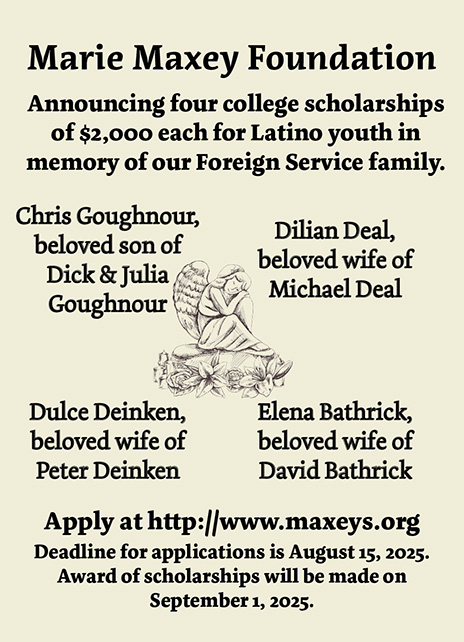Stone Fruit Diplomacy: From the Golden State to the Land of the Blue Dragon
The significant progress made in agricultural trade over the last 30 years highlights the mutual benefits and promising future of the U.S.-Vietnam partnership.
BY MARC GILKEY
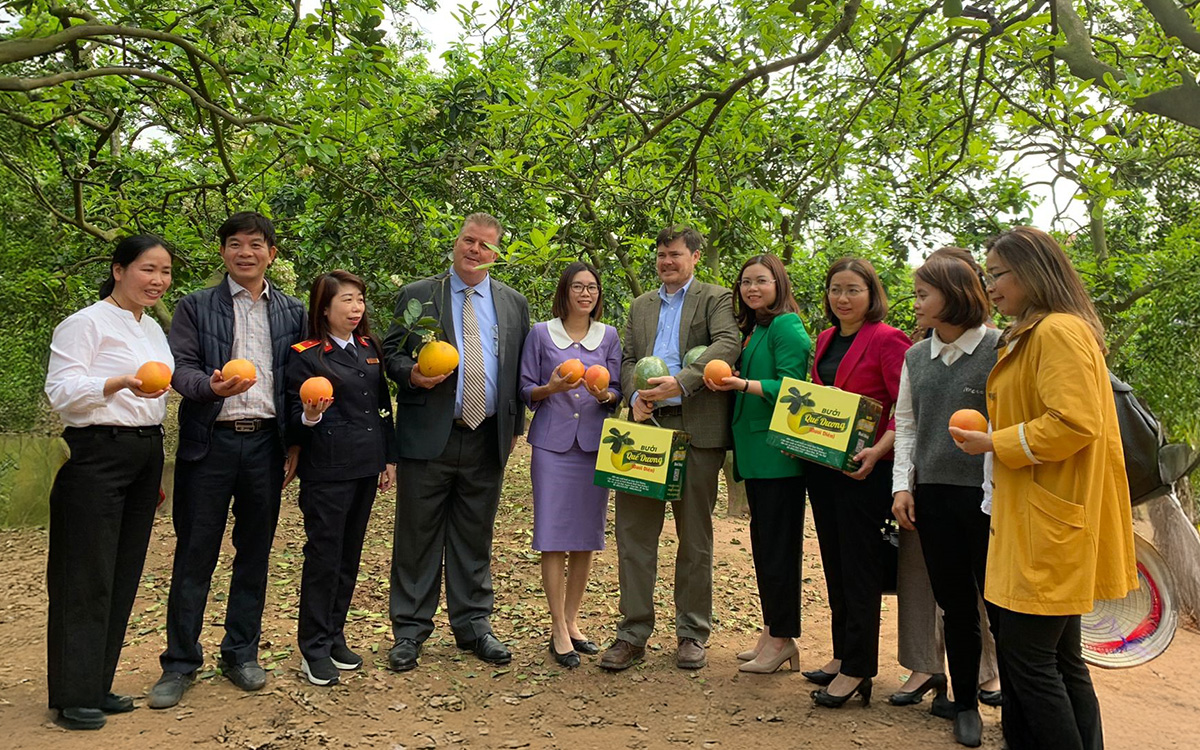
Marc Gilkey (fourth from left) and J.J. Hurley (fifth from right) stand with Vietnamese officials in an orchard at the height of bloom on the outskirts of Hanoi celebrating the exchange of Texas Ruby Red grapefruit for Vietnamese pomelos in 2023.
Courtesy of Marc Gilkey
The year 1995, when the United States and Vietnam officially normalized diplomatic relations, was a major turning point, unlocking a new era of cooperation and engagement. Deeper diplomatic relations are often led by increased trade and cooperation, and trade in agricultural products is often at the center of that cooperation. Nations have come to the table for thousands of years to negotiate, cooperate, and trade the bounty and surplus provided by agriculture. The significant progress made in agricultural trade and other sectors highlights the mutual benefits and promising future of the U.S.-Vietnam partnership.
The International Service (IS) wing of the Animal and Plant Health Inspection Service (APHIS) plays a unique and pivotal role in facilitating global agricultural trade. IS maintains a Foreign Service cadre stationed in U.S. embassies, enabling direct and immediate engagement with international partners to facilitate trade and prevent disruptions. Besides working to expand U.S. agricultural trade, the Foreign Service works to safeguard and strengthen it through technical cooperation.
From the early 2000s, APHIS and other agencies worked tirelessly to open and maintain market access for U.S. agricultural products in Vietnam. A big part of this success was ensuring safe trade practices, which involves meticulous sanitary and phytosanitary measures to protect both countries’ agricultural sectors from invasive plant pests and animal diseases.
Today, as we celebrate the 30th anniversary of U.S.-Vietnam diplomatic relations and mark 50 years since the end of the war, Vietnam ranks as the United States’ 10th-largest export market for agricultural and food products (up from 24th just 15 years ago), while the United States is the largest agricultural export market for Vietnam. In addition to fruit, the U.S. exports cotton, soybeans, tree nuts, and poultry to Vietnam—all of which APHIS contributed significantly to facilitating and maintaining.
New Milestones
On Sept. 10, 2023, the U.S.-Vietnam relationship reached a new milestone when it was elevated to a Comprehensive Strategic Partnership. This historic move marked a new phase of bilateral cooperation aimed at peace, cooperation, and sustainable development. Not long after, the symbolic exchange of Vietnamese pomelo and U.S. grapefruit took place. At the height of bloom in a pomelo orchard on the outskirts of Hanoi, APHIS International Services and Vietnam’s Plant Protection Department symbolically solidified the relationship between the United States and Vietnam by trading U.S. (Texas) grapefruit with a local farmer and Vietnamese officials in exchange for a Vietnamese pomelo. It was “citrus diplomacy” in action.
Vietnam ranks as the United States’ 10th-largest export market for agricultural and food products, while the United States is the largest agricultural export market for Vietnam.
For those who don’t know, APHIS is the smallest Foreign Service agency, but our work is at the heart of most agricultural trade. The APHIS Foreign Service, called “International Services,” is the platform by which APHIS delivers all technical talent to support international agricultural diplomacy. We actively back and cultivate the capacity of communities, institutions, and governments to manage threats to agriculture in a way that is sustainable, effective, and protects plants, animals, and the finely interwoven global agricultural community.
International Services encompasses a range of technical experts in entomology, plant pathology, animal health, aquaculture, and risk management, whose expertise is leveraged across APHIS. We develop strategies to anticipate and address disease outbreaks, and we serve as a technical body assisting in the systematic identification, mitigation, and management of agricultural pests and diseases to reduce global crop and livestock losses. Through collaboration with foreign counterparts at diplomatic, policy, and technical levels, APHIS promotes science-based regulatory transparency that leads to safe and resilient agricultural trade.
Market access for fruits from the U.S. to Vietnam and vice versa supports producers and consumers of both countries. Thus, citrus diplomacy was followed by “stone fruit diplomacy” a year later. Looking at the U.S.-Vietnam relationship and working closely with the California Fresh Fruit Association (CFFA), APHIS determined that Vietnam, the “Land of the Blue Dragon,” could be a strategic export market for the “golden” state’s stone fruit industry.
In Vietnam, the dragon is a positive symbol of rain, agriculture, strength, and good luck; and the country’s coastal location and stunning azure waters add “blue.” Vietnamese consumers value high-quality and sweet fruit; California peaches and nectarines would most definitely meet this requirement. (I must admit—being from California and growing up on such amazing fresh fruit—there is nothing better than a juicy peach or nectarine on a hot August day.)
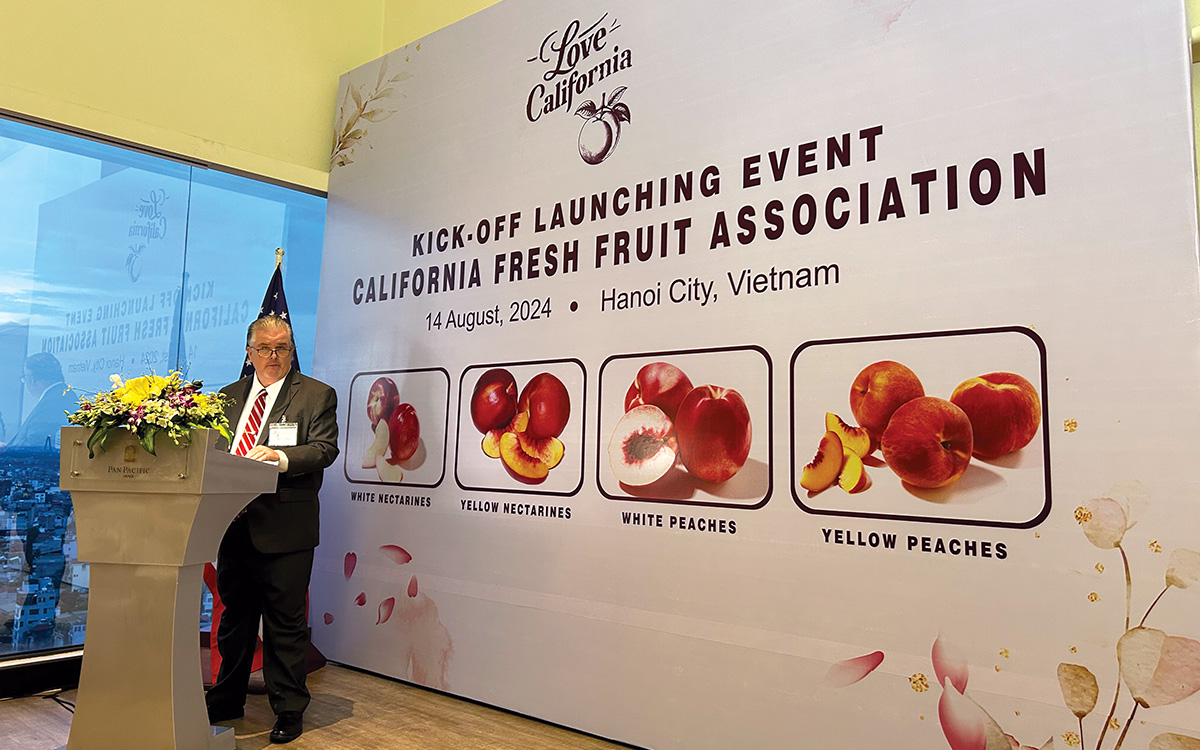
The author provides opening remarks at the California Fresh Fruit Association (CFFA) “Love California” event celebrating market access for peaches and nectarines in August 2024.
Klever Fruit
“Stone Fruit” Diplomacy
But as you probably guessed, it isn’t as easy as simply sending the fruit to Vietnam. This is where the APHIS Foreign Service comes in. The regulatory process is arduous, requiring on-the-ground engagement and numerous rounds of bilateral consultations. First, all the potential plant pests and diseases must be identified in what we call a Pest Risk Assessment (PRA), and then risk mitigation measures are identified. After that, there are rounds of negotiation to establish guidelines. Only then can an import permit be issued, and California can begin to send its tasty and sweet peaches and nectarines.
Normally I would focus on all the technical hurdles we faced, but this story is more about one perfect day in Hanoi, a warm, pleasant August day—Aug. 14, 2024, to be exact—when some APHIS folks made history. The APHIS team in Hanoi is led by Senior Foreign Service Officer J.J. Hurley, with Brooke Rockentine as one of our newest Foreign Service officers, and locally employed (LE) staff members, agricultural scientists Nguyễn Thị Hương and Phạm Thanh Phương. Local staff played an especially critical role in making Aug. 14 happen; through their work, we identified the Vietnamese importer, someone willing to be the first to take a chance, Klever Fruits. Klever was the first to import California peaches and nectarines on that beautifully warm and pleasant day when Vietnam welcomed the initial shipment.
Market access for fruits from the U.S. to Vietnam and vice versa supports producers and consumers of both countries.
Brooke and Hương met the shipment at the airport and worked with Vietnam’s Plant Protection Department (PPD) to inspect and clear the fruit for celebrations across the city. Brooke participated in celebrating the first shipment with Klever Fruit and even shared her grandmother’s peach cobbler recipe with the company.
Next was a fruit tasting event and a very symbolic welcome of a wrapped present of this “California Gold.” The containers arrived with a big red ribbon, a gift to the people of Vietnam. The event was perfectly planned, and the tasting was delicious, as expected. After the tasting event, a very elegant evening event got quickly underway. Hosted by Klever Fruit, the event unveiled California peaches and nectarines to the Vietnamese consumer. U.S. Ambassador to Vietnam Marc Knapper gave opening remarks, interviews, and overall support of the new market access. He expressed his appreciation to Vietnam’s Ministry of Agriculture and Rural Development and encouraged the advancement of trade opportunities for both countries.
I was honored to give opening remarks as well, highlighting the teamwork between APHIS and Vietnam’s Plant Protection Department. At the end, Caroline Stringer, director of trade for the California Fresh Fruit Association, gifted peaches and nectarines to all dignitaries. The event concluded with dinner, pictures, and, of course, a lot of peaches and nectarines.
When all was done, I thanked the amazing APHIS staff in Hanoi, rushed back along the same path the peaches and nectarines had just taken to gather my family in Bangkok, and headed home to the Golden State.
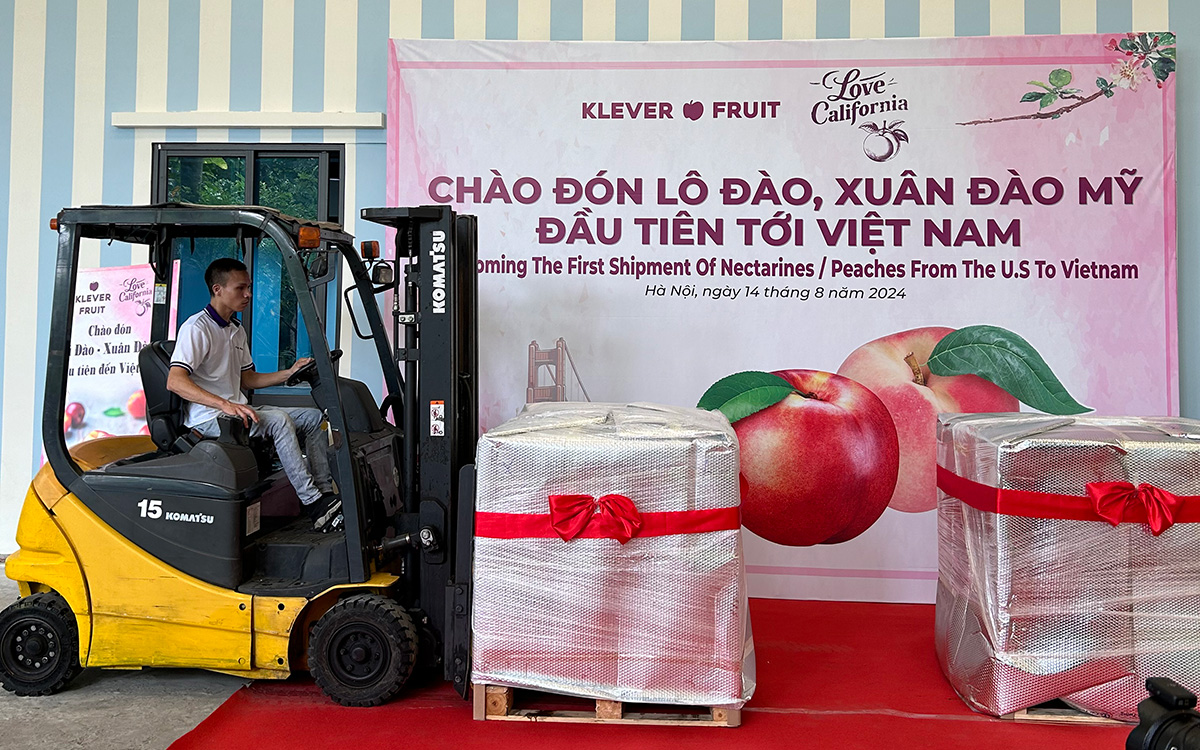
The first shipment of “California gold” from the Golden State is delivered to the taste testing event in August 2024.
Klever Fruit
A Long Journey
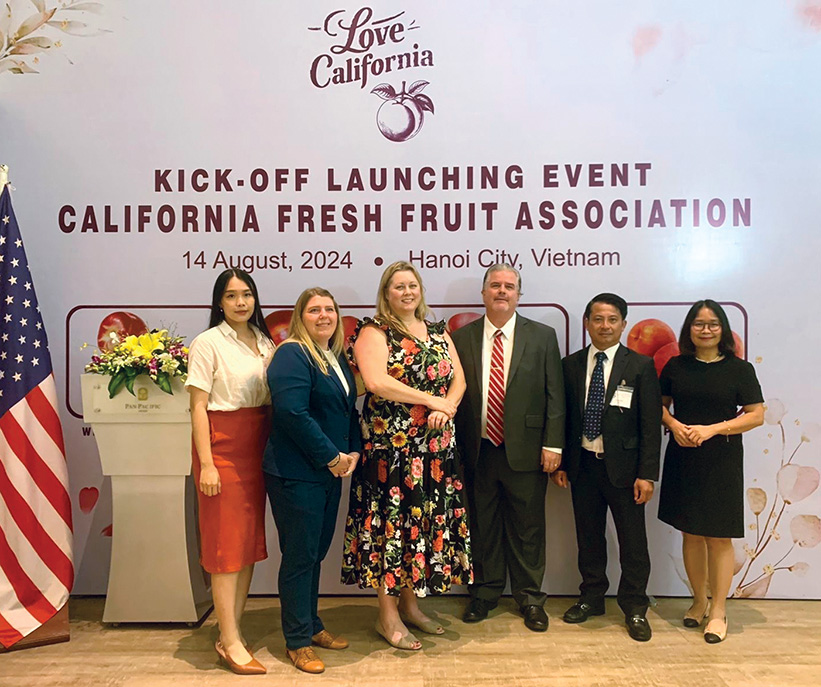
The APHIS Team and California Fresh Fruit Association enjoy the fruits of their labor in August 2024. From left: Phạm Thanh Phương, Brooke Rockentine, Caroline Stringer (CFFA), Marc Gilkey, Đỗ Hữu Dũng, and Nguyễn Thị Hương.
Klever Fruit
After picking up the rental car and heading down State Route 99 toward Sacramento, as we have dozens of times to visit family, I was thrilled to pass a small green sign installed along the roadside to celebrate Sacramento’s Vietnamese community. In 2010 the City Council designated a two-mile section of Stockton Boulevard as “Little Saigon.” It’s a vibrant, lively neighborhood with dozens of Vietnamese restaurants, coffee shops, jewelry stores, bakeries, and markets. This neighborhood is a remembrance of the shared Vietnamese and American history, a history of both war and friendship, creating a lasting legacy that continues to heal and evolve.
The evolution of U.S.-Vietnam relations from the fall of Saigon to the establishment of the Comprehensive Strategic Partnership and beyond is a testament to the power of diplomacy and cooperation. APHIS International Services has played a crucial role in this journey, demonstrating the importance of dedicated and skilled diplomats in identifying and achieving opportunities and progress.
Klever Fruit, the Vietnamese importer, uses the Golden Gate Bridge in their promotional campaign for California peaches and nectarines. Across Asia, the bridge—whose name, “Golden Gate,” referred historically to the entrance of trade into the U.S. from the Pacific Rim—is often seen as a symbol of American innovation and progress. The gateway between the Americas and the East, it represents the potential for global exchange and deepening connection across the Pacific.
When sharing or linking to FSJ articles online, which we welcome and encourage, please be sure to cite the magazine (The Foreign Service Journal) and the month and year of publication. Please check the permissions page for further details.
Read More...
- “Return to Vietnam: Observations in 2015” by Parker W. Borg, The Foreign Service Journal, April 2015
- “Avocado Diplomacy: Supporting Peace in Colombia” by Marc Gilkey, The Foreign Service Journal, June 2019
- “Pomelo Diplomacy” by Marc Gilkey, The Foreign Service Journal, March 2024
- “U.S. peaches and nectarines are granted access to the Vietnamese market,” Fresh Fruit Portal, August 2024




